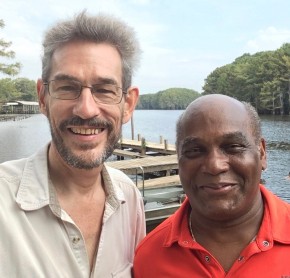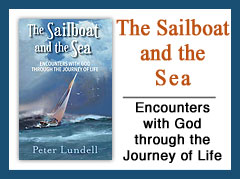Amazed at What I Didn’t Know
 One of my richest aspects of living in the South has been learning about the African-American experience. Before I came here I thought I understood it. I could not have been more naively mistaken. I learned at the nation’s primary exhibits in Atlanta, GA; Montgomery, AL; and Jackson, MS. Month after month my church member and dear friend, Jerry, who’s with me in the photo, graciously interacted with me about what things were like in the past, and what still lingers.
One of my richest aspects of living in the South has been learning about the African-American experience. Before I came here I thought I understood it. I could not have been more naively mistaken. I learned at the nation’s primary exhibits in Atlanta, GA; Montgomery, AL; and Jackson, MS. Month after month my church member and dear friend, Jerry, who’s with me in the photo, graciously interacted with me about what things were like in the past, and what still lingers.
I’ve come to see politics and human rights at a much deeper level. Yet I’ve also seen how in contemporary politics and political correctness, words and accusations sometimes get batted around in ways that can be superficial and manipulative. The historical realities are far more horrific than most people realize—certainly more than I ever did.
And in the face of that, I’ve been amazed at the graciousness of African Americans across the South.
I’ve also discovered that racism was far worse throughout the entire United States, including my home state of Minnesota, than I had ever imagined. So much has been whitewashed away. Yet we can be grateful for the progress—centuries in the making—that has been made. And in more subtle ways progress must continue to be made.
I’ve also come to understand “liberal” and “conservative” in ways that carry entirely different meanings in the South from the ways they’re understood in, for example, California, where I lived for so long. Sometimes it all makes me dizzy.
So in the end, I keep coming back to the foundational biblical impetus for the original Abolition [of slavery] Movement and the Civil Rights Movement—that regardless of race, all people are created by God to have dignity and freedom. In a politically divisive atmosphere that is so often hyped, those of us who identify as followers of Christ have a beautiful, singular position from which to operate, and a singular hope that sustains us: the Kingdom of God.
Identity with the Kingdom of God above all else empowers a believer to transcend anything that goes on—past, present, or future. Those things may be spiritual, daily life, or political. But regardless, the core issue that has always cut through everything is our identity in Christ, founded on God’s Word. The question then is: What redemptive part do we play in his Kingdom?
Who are you?
And what redemptive part do you play in God’s Kingdom?








Thanks
God bless you abundantly Amen